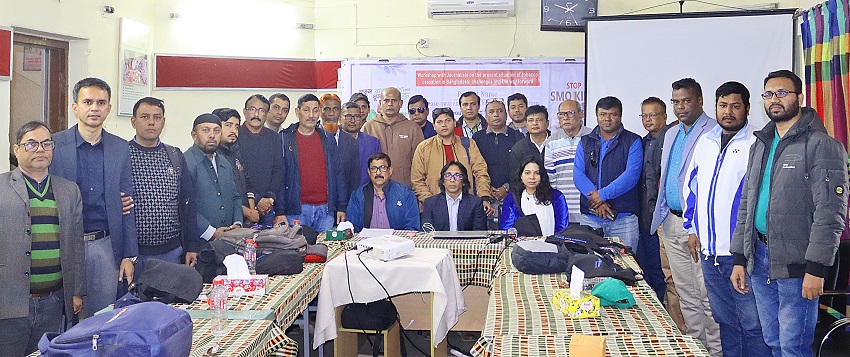A day-long workshop on the current situation of tobacco control, its challenges, and potential solutions was held in Dinajpur on Sunday, focusing on raising awareness about the harmful effects of tobacco and smoking.
The workshop, organized by the Bangladesh Blind Mission (BBM) under the "Increasing Awareness on Tobacco Harm Reduction in South Asian Countries" project, took place at Pollisree NGO hall room in Balubari area of the city.
The event was attended by 25 journalists from various print and electronic media outlets, including the General Secretary of Dinajpur Press Club.
The session included lively discussions on the detrimental effects of smoking and tobacco use, with statistics stating that 80 lakh people die each year due to tobacco consumption.
Nationally recognized development consultant Shubhashish Chandra Mohanta presented on the damages caused by tobacco, while Khondokar Abedul Islam, Admin and Finance Manager of BBM, delivered the welcome address. The session was moderated by BBM Project Officer Tarek Mahmood.
According to the World Health Organization (WHO), tobacco-related deaths worldwide total 80 lakh per year. A 2022 study indicated that 28.6% of adults in Bangladesh smoke, with 47.7% of men and 8.7% of women participating in the habit. Smoking-related deaths have been rising steadily. A 2021 study reported that approximately 1.6 lakh people die annually in Bangladesh due to smoking, with 20.8% of male and 0.9% of female deaths attributed to smoking.
The workshop also discussed strategies for quitting smoking, emphasizing the effectiveness of combining behavioral support with medications. Drugs such as Varenicline, Nicotine Replacement Therapy (NRT), Bupropion and Cytisine are recommended for smoking cessation.
Recommendations from the journalists during the workshop included stricter enforcement of laws to prohibit smoking in public spaces, regulating the sale and production of tobacco products, counseling families about the harmful effects of smoking, encouraging smoking cessation, imposing higher taxes on tobacco products, enforcing stringent laws, raising awareness through advertising, banning the sale of tobacco products near schools and colleges, and highlighting the harmful effects of tobacco through writing and campaigns.
